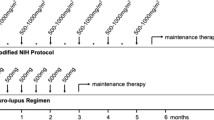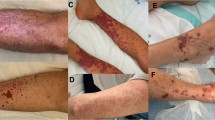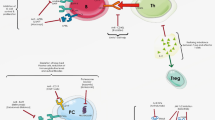Abstract
Peripheral neuropathy associated with monoclonal gammopathy is a rare but important cause of neuropathy that can herald serious underlying disease. IgM monoclonal gammopathy of undetermined significance (MGUS) is the most commonly found monoclonal gammopathy associated with neuropathy, with characteristic clinical, electrophysiologic, and pathologic features. The IgG and IgA monoclonal gammopathies are rarely associated with specific neuropathies. Standard immunomodulatory agents including steroids, intravenous immunoglobulin, and plasmapheresis have shown limited efficacy in IgM MGUS. Neuropathies associated with specific lymphoproliferative disorders may not respond to treatments aimed at that disorder. Case series had shown promising results with rituximab, a monoclonal antibody that targets the B cell surface antigen CD20 and results in a rapid and sustained depletion of B cells; however, two recent randomized controlled trials with rituximab failed to provide evidence of efficacy in primary outcome measures, despite reduction in antibody levels. Long-term studies looking at the association between specific immunologic markers and disease recurrence are needed to ultimately develop targeted therapies.
Similar content being viewed by others
References
Papers of particular interest, published recently, have been highlighted as: • Of importance •• Of major importance
Silverstein A, Doniger DE. Neurologic complications of myelomatosis. Arch Neurol. 1963;9:534–44.
Walsh JC. The neuropathy of multiple myeloma: an electrophysiological and histological study. Arch Neurol. 1971;25:404–14.
Kelly Jr JJ. Peripheral neuropathies associated with monoclonal gammopathies of undetermined significance. Rev Neurol Dis. 2008;5:14–22.
Silberman J, Lonial S. Review of peripheral neuropathy in plasma cell disorders. Hematol Oncol. 2008;26:55–65.
Kwan JY. Dysimmune Neuropathy. In: Pourmand R (ed) Immune-mediated neuromuscular diseases. Front Neurol Neurosci. Basel, Karger, 2009;26:67–84.
Rajabally YA. Neuropathy and paraproteins: review of a complex association. Eur J Neurol. 2011 Mar 21. doi: 10.1111/j.1468-1331.2011.03380.x. Epub ahead of print.
Nobile-Orazio E. Update on neuropathies associated with monoclonal gammopathy of undetermined significance (2008–2010). J Peripher Nerv Syst. 2010;15(4):302–6.
Axelsson U, Holmberg A. Frequency of pathological proteins (M-components) in 6,995 sera from an adult population. Acta Med Scand. 1966;179:235–47.
Saleun JP, Vicariot M, Deroff P, Morin JF. monoclonal gammopathies in the adult population of Finistere, France. J Clin Pathol. 1982;35:63–8.
Crawford J, Eye MK, Cohen ITJ. Evaluation of monoclonal gammopathies in the “well” elderly. An J Med. 1987;82:39–45.
Kelly JJ, Kyle RA, O’Brien PC, et al. Prevalence of monoclonal protein in peripheral neuropathy. Neurology. 1981;31:1480–3.
Latov N. Pathogenesis and therapy of neuropathies associated with monoclonal gammopathies. Ann Neurol. 1995;37:S32–42.
Miralles GD, O’Fallon JR, Talley NJ, et al. Plasma cell dyscrasia with Polyneuropathy: the spectrum of POEMS syndrome. NEJM. 1992;327:1919–23.
Richardson P, Chanan-Khan A, Schlossman R, et al. A multicenter phase II trial of bortezomib in patients with previously untreated multiple myeloma: efficacy with manageable toxicity in patients with unexpectedly high rates of baseline peripheral neuropathy. Blood 2005;106. Abstract 2548.
Nobile-Orazio E, Barbieri S, Baldini L, et al. Peripheral neuropathy in monoclonal gammopathy of unknown significance: prevalence and immunopathogenetic studies. Acta Neurol Scand. 1992;85:383–90.
Vrethem M, Cruz M, Wen Xin H, et al. Clinical, neurophysiological, and immunological evidence of polyneuropathy in patients with monoclonal gammopathies. J Neurol Sci. 1993;114:193–9.
Kyle RA, Gertz MA. Primary systemic amyloidosis: clinical and laboratory features in 474 cases. Semin Hematol. 1995;32:45–59. 47.
Kyle RA, Greipp PR. Amyloidosis (AL):clinical and laboratory features in 229 cases. Mayo Clin Proc. 1983;58:665–83.
Dimopolous MA, Alexanian R. Waldenstrom’s macroglobulinemia. Blood. 1994;83:1452–9.
Vachon CM, Kyle RA, Therneau TM, et al. Increased risk of monoclonal gammopathy of undetermined significance. Blood. 2009;114:785–90.
Cohen HJ. Prevalence of monoclonal gammopathy of undetermined significance. NEJM. 2006;354:2832.
Landgren O, Gridley G, Turesson I, et al. Risk of monoclonal gammopathy of undetermined significance and subsequent multiple myeloma among African American and white veterans in the United States. Blood. 2006;107:904–6.
Landgren O, Weiss B. Patterns of monoclonal gammopathy and multiple myeloma in various ethnic/racial groups: support for genetic factors in pathogenesis. Leukemia. 2009;23:1691–7.
Iwanaga M, Tagawa M, Tsukansaki K, et al. Relationship between monoclonal gammopathy of undetermined significance and radiation exposure in Nagasaki atomic bomb survivors. Blood. 2007;113:1639–50.
Landgren O, Kyle RA, Hoppin JA, et al. Pesticide exposure and risk of monoclonal gammopathy of undetermined significance in the Agricultural Health Study. Blood. 2009;113:6386–91.
Kyle RA. “Benign” monoclonal gammopathy: a misnomer? JAMA. 1984;251:1849–54.
Eurelings M, Lokhorst HM, Kalmijn S, et al. Malignant transformation in polyneuropathy associated with monoclonal gammopathy. Neurology. 2005;64:2079–84.
Berenson JR, Anderson KC, Audell RA, et al. Monoclonal gammopathy of undetermined significance: a consensus statement. Br J Haematol. 2010;150(1):28–38.
Hadden RD, Nobile-Orazio E, Sommer CL, et al. European Federation of Neurological Societies/Peripheral Nerve Society Guideline on management of paraproteinemic demyelinating neuropathies. Report of a Joint Task Force of the European Federation of Neurological Societies and the Peripheral Nerve Society--first revision. J Peripher Nerv Syst. 2010;15(3):185–95.
Kyle RA. Plasma cell dyscrasias. In: Spitell Jr JA, editor. Clinical medicine. Philadelphia: Harper & Row; 1981. p. 1–35.
Nobile-Orazio E, Gallia F, Terenghi F, et al. How useful are anti-neural IgM antibodies in the diagnosis of chronic immune-mediated neuropathies? J Neurol Sci. 2008;266:156–63.
Kujif ML, Eurelings M, Tio-gillen AP, et al. Detection of anti-MAG antibodies in polyneuropathy associated with IgM monoclonal gammopathy. Neurology. 2009;73:688–95.
Nobile-Orazio E. Paraproteinemia related neuropathies. Haematologica. 2007;92(s2):62–4.
Nobile-Orazio E, Manfredi E, Carpo M, et al. Frequency and clinical correlates of anti-neural IgM antibodies in neuropathy associated with IgM monoclonal gammopathy. Ann Neurol. 1994;36:416–24.
Latov NR, Hays AP, Sherman WH. Peripheral neuropathy and anti-MAG antibodies. CRC Crit Rev Neurobiol. 1988;3:301–32.
Ellis E, Vital A, Steck A, et al. Neuropathy associated with “benign” anti-myelin-associated glycoprotein IgM gammopathy: clinical, immunological, neurophysiological and pathological findings and response to treatment in 33 cases. J Neurol. 1996;243:34–43.
Tatum AH. Experimental paraprotein neuropathy, demyelination by passive transfer of human IgM anti-myelin-associated glycoprotein. Ann Neurol. 1993;33502–506.
Ilyas AA, Gu Y, Dalakas MC, et al. Induction of experimental ataxic sensory neuronopathy in cats by immunization with purified SGPG. J Neuroimmunol. 2008;193:87–93.
Notermans NC, Lokhorst HM, Franssen H, et al. Intermittent cyclophosphamide and prednisone treatment of polyneuropathy associated with monoclonal gammopathy of undetermined significance. Neurology. 1996;47:1227–33.
Gorson KC. Clinical features, evaluation and treatment of patients with polyneuropathy associated with monoclonal gammopathy of undetermined significance (MGUS). J Clin Apher. 1999;14:149–53.
Stalder AK, Erne B, Reimann R, et al. Immunoglobulin M deposition in cutaneous nerves of anti-myelin associated glycoprotein Polyneuropathy patients correlates with axonal degeneration. J Neuropathol Exp Neurol. 2009;68:148–58.
Lewis RA, Eilender DS, Li J. Rituximab is effective for some patients with IgM kappa related polyneuropathy: a report of results in 8 patients. Neurology. 2003;60 suppl 1:A 491.
Lewis RA, Sheth SG. Long term efficacy of rituximab for IgM and anti-MAG neuropathy. J Peripher Nerv Syst. 2008;13:A 175.
Nobile-Orazio E, Giannotta C, Briani C. Anti-ganglioside complex IgM antibodies in multifocal motor neuropathy and chronic immune-mediated neuropathies. J Neuroimmunol. 2010;219:119–22.
Di Troia A, Carpo M, Meucci N, et al. Clinical features and anti-neural reactivity in neuropathy associated with IgG monoclonal gammopathy of undetermined significance. J Neurol Sci. 1999;164:64–71.
Vrethem M, Reiser N, Lauermann C, et al. Polyneuropathy associated with IgM vs. IgG monoclonal gammopathy: comparison between clinical and electrophysiological findings. Acta Neurol Scand. 2010;122:52–7.
Vital A, Nedelec-Ciceri C, Vital C. Presence of crystalline inclusions in the peripheral nerve of a patient with IgA lambda monoclonal gammopathy of undetermined significance. Neuropathology. 2008;28:526–31.
• Vallat JM, Magy L, Richard L, et al. Contribution of electron microscopy to the study of neuropathies associated with an IgG monoclonal paraproteinemia. Micron. 2008;39:61–70. This review on M protein deposition in the myelin sheath and widening of the myelin lamellae seen on electron microscopy suggests a direct causal link to the neuropathy.
•• Niermeijer JMF, Fischer K, Eurelings M, et al. Prognosis of polyneuropathy due to IgM monoclonal gammopathy. Neurology 2010;74: 406–12. This retrospective review of 140 patients with IgM MGUS attempted to identify factors associated with worse outcomes based on clinical and demographic variables, and found that although older age and demyelination worsened the long-term prognosis of disability, interestingly, the presence of anti-MAG antibodies reduced the risk of long-term disability. This raises the question of whether reduction of anti-MAG titers is a relevant biomarker or surrogate outcome measure in clinical trials.
Nobile-Orazio E, Meucci N, Baldini L, et al. Long term prognosis of neuropathy associated with anti-MAG IgM M proteins and its relation with immune therapies. Brain. 2000;123:710–7.
Saperstein DS, Katz JS, Amato AA, Barohn RJ. Clinical spectrum of chronic acquired demyelinating polyneuropathies. Muscle Nerve. 2001;24(3):311–24.
Larue S, Bombelli F, Viala K, et al. Non-anti-MAG DADS neuropathy as a variant of CIDP: clinical, electrophysiological, laboratory features and response to treatment in 10 cases. Eur J Neurol. 2011;18:899–905.
Van den Bergh PYK, Hadden RDM, Bouche P, Cornblath DR, Hahn A, Illa I, et al. European Federation of Neurological Societies/Peripheral Nerve Society Guideline on management of chronic inflammatory demyelinating polyradiculoneuropathy: report of a joint task force of the European Federation of Neurological Societies and the Peripheral Nerve Society—First Revision. European Journal of Neurology. 2010;17:356–63.
Kaku DA, England JD, Sumner AJ. Distal accentuation of conduction slowing in polyneuropathy associated with antibodies to myelin-associated glycoprotein and sulphated glucuronyl paragloboside. Brain. 1994;117:941–7.
Simmons Z, Bromberg MB, Feldman EL, Blaivas M. Polyneuropathy associated with IgA monoclonal gammopathy of undetermined significance. Muscle Nerve. 1993;16:77–83.
Magy L, Chassande B, Maisonobe T, et al. Polyneuropathy associated with IgG/IgA monoclonal gammopathy: a clinical and electrophysiological study of 15 cases. Eur J Neurol. 2003;10:677–85.
Klein CJ, Moon JS, Mauermann ML, et al. The neuropathies of Waldenström’s macroglobulinemia (WM) and IgM-MGUS. Can J Neurol Sci. 2011;38(2):289–95.
Gertz MA. Waldenstrom macroglobulinemia: 2011 update on diagnosis, risk-stratification and management. Am J Hematol. 2011;86:411–6.
Dierlamm T, Laack E, Dierlamm J, et al. IgM Myeloma: a report of four cases. Ann Hematol. 2002;81:136–9.
Roussel M, Facon T, Moreau P, et al. Firstline treatment and maintenance in newly diagnosed multiple myeloma patients. Recent Results Cancer Res. 2011;183:189–206.
Bardwick PA, Zvaifler NJ, Gill GN, et al. Plasma cell dyscrasia with polyneuropathy, organomegaly, endocrinopathy, M-protein and skin changes: the POEMS syndrome; report on two cases and a review of the literature. Medicine. 1980;59:311–22.
Vital A. Paraproteinemic neuropathies. Brain Pathol. 2001;11:399–407.
Dispenzieri A. POEMS syndrome: 2011 update on diagnosis, risk-stratification, and management. Am J Hematol. 2011;86(7):591–601.
Gherardi RK, Belec L, Soubrier M, et al. Overproduction of proinflammatory cytokines imbalanced by their antagonists in POEMS syndrome. Blood. 1996;87:1458–65.
Kyle RA, Rajkumar SV. Criteria for diagnosis, staging, risk stratification and response assessment of multiple myeloma. Leukemia. 2009;23:3–9.
Willison HJ, O’Leary CP, Veitch J, et al. The clinical and laboratory features of chronic sensory ataxic neuropathy with anti-disialosyl IgM antibodies. Brain. 2001;124:1968–77.
Kyle RA, Gertz MA, Greipp PR, et al. Long-term survival (10 years or more) in 30 patients with primary amyloidosis. Blood. 1999;93:1062–6.
Gertz MA. Immunoglobulin light chain amyloidosis:2011 update on diagnosis, risk stratification and management. Am J Hematol. 2011;86:180–6.
Joint Task Force of the EFNS and the PNS. European Federation of Neurological Societies/Peripheral Nerve Society Guideline on management of paraproteinemic demyelinating neuropathies. Report of a joint task force of the European Federation of Neurological Societies and the Peripheral Nerve Society. J Peripher Nerv Syst. 2006;11:9–19.
Delmont E, Jeandel PY, Hubert AM, et al. Successful treatment with rituximab of one patient with CANOMAD neuropathy. J Neurol. 2010;257(4):655–7.
Attarian S, Boucraut J, Hubert AM, et al. Chronic ataxic neuropathies associated with anti-GD1b IgM antibodies: response to IVIg therapy. J Neurol Neurosurg Psychiatry. 2010;81(1):61–4.
Rotta FT, Sussman AT, Bradley WG, et al. The spectrum of chronic inflammatory demyelinating polyneuropathy. J Neurol Sci. 2000;173:129–39.
Katz JS, Saperstein DS, Gronseth G, et al. Distal acquired demyelinating symmetric neuropathy. Neurology. 2000;54:615.
Dyck PJ, Low PA, Windebank AJ, et al. Plasma exchange in polyneuropathy associated with monoclonal gammopathy of undetermined significance. N Engl J Med. 1991;325:1482–6.
Oksenhendler E, Chevret S, Leger JM, et al. Plasma exchange and chlorambucil in polyneuropathy associated with monoclonal IgM gammopathy. IgM-associated polyneuropathy study group. J Neurol Neurosurg Psychiatry. 1995;59:243–7.
Haas DC, Tatum AH. Plasmapheresis alleviated neuropathy accompanying IgM anti-myelin associated glycoprotein paraproteinemia. Ann Neurol. 1988;23:394–6.
Gorson KC, Ropper AH, Weinberg DH, Weinstein R. Treatment experience in patients with anti-myelin-associated glycoprotein neuropathy. Muscle Nerve. 2001;24:778–86.
Wilson HC, Lunn MP, Schey S, Hughes RA. Successful treatment of IgM paraproteinemia with fludarabine. J Neurol Neurosurg Psychiatry. 1999;66:575–80.
Dalakas MC, Quarles RH, Farrer RG, et al. A controlled study of intravenous immunoglobulin in demyelinating neuropathy with IgM gammopathy. Ann Neurol. 1996;40:792–5.
Lunn MP, Nobile-Orazio E. Immunotherapy for IgM anti-myelin-associated glycoprotein paraprotein-associated peripheral neuropathies. Cochrane Database Syst Rev. 2006;19(2):CD002827.
Latov N, Sherman WH, Vlahides G. Therapy of neuropathy associated with anti-MAG IgM monoclonal gammopathy with rituxan. Neurology. 1999;52(S2):A551.
Levine TD, Pestronk A. IgM antibody-related polyneuropathies: B cell depletion chemotherapy using rituximab. Neurology. 1999;52:1701–4.
Kelly JJ. Chronic peripheral neuropathy responsive to rituximab. Rev Neurol Dis. 2006;3(2):78–81.
Benedetti L, Briani C, Grandis M, et al. Predictors of response to rituximab in patients with neuropathy and anti-myelin associated glycoprotein immunoglobulin M. J Peripher Nerv Syst. 2007;12:102–7.
•• Dalakas MC, Rakocevic G, Salajegheh M, et al. Placebo-controlled trial of rituximab in IgM anti-myelin-associated glycoprotein antibody demyelinating neuropathy. Ann Neurol. 2009;65:286–293. This is the first randomized, placebo-controlled trial that showed evidence of motor and sensory improvement in patients with anti-MAG demyelinating neuropathy treated with rituximab. It raises a number of interesting hypotheses on the pathogenesis of the disease and B-cell depletion, anti-MAG antibody titers, and immunoregulatory T cell induction.
•• Benedetti L, Briani C, Franciotta D, et al. Long-term effect of rituximab in anti-MAG polyneuropathy. Neurology 2008;71:1742–4. This is a long-term report on patients treated with rituximab for anti-MAG neuropathy, which showed persistent long-term improvement despite the reappearance of circulating B cells. Relapses correlated to either a high baseline anti-MAG titer, and/or increase during the follow-up period, suggesting that anti-MAG titers may be a useful marker of disease activity.
Niermeijer JMF, Eurelings M, Lokhorst HL, et al. Rituximab for polyneuropathy with IgM monoclonal gammopathy. J Neurol Neurosurg Psychiatry. 2009;80:1036–9.
Leger J-M, Viala K, Bombelli F, et al. For the RIMAG trial group (France and Switzerland): Randomized controlled trial of rituximab in demyelinating neuropathy associated with anti-MAG IgM gammopathy (RIMAG study). J Peripher Nerv Syst. 2010;15:269.
Carson KR, Evens AM, Richey EA, et al. Progressive multifocal leukoencephalopathy after rituximab therapy in HIV-negative patients: a report of 57 cases from the Research on Adverse Drug Events and Reports project. Blood. 2009;113(20):4834–40.
Gorelik L, Lerner M, Bixler S, et al. Anti-JC virus antibodies: implications for PML risk stratification. Ann Neurol. 2010;68(3):295–303.
Ramchandren S, Lewis RA. Monoclonal gammopathy and neuropathy. Curr Opin Neurol. 2009;22(5):480–5.
Disclosure
Conflicts of interest: S. Ramchandren; none; R.A. Lewis: has been a consultant for CSL Behring regarding a clinical trial development in CIDP; has received grant support from Baxter for MMN registry and CSL Behring for Pk/PD study of IVIg; and has received travel/accommodations expenses covered or reimbursed from Baxter for IVIg meeting and CSL Behring for Steering Committee meeting.
Author information
Authors and Affiliations
Corresponding author
Rights and permissions
About this article
Cite this article
Ramchandren, S., Lewis, R.A. An Update on Monoclonal Gammopathy and Neuropathy. Curr Neurol Neurosci Rep 12, 102–110 (2012). https://doi.org/10.1007/s11910-011-0237-4
Published:
Issue Date:
DOI: https://doi.org/10.1007/s11910-011-0237-4




